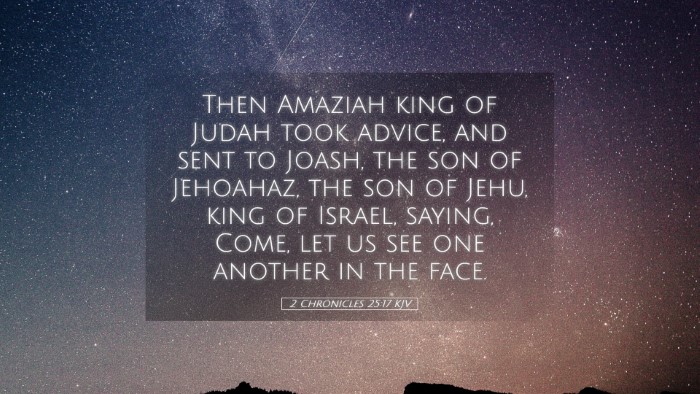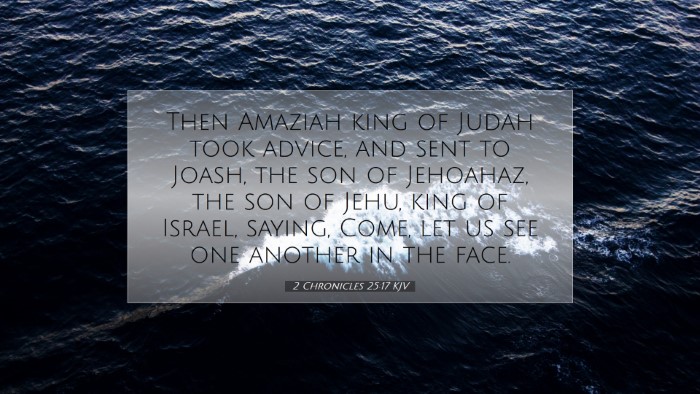Commentary on 2 Chronicles 25:17
“Then Amaziah king of Judah took advice, and sent to Joash the son of Jehoahaz the son of Jehu, king of Israel, saying, Come, let us see one another in the face.”
Introduction
The verse at hand, 2 Chronicles 25:17, provides a significant insight into the interactions between two kings of Israel and Judah, particularly illustrating the complexities of leadership, diplomacy, and the intertwining of faith and political maneuvering in ancient times. This analysis will draw from various public domain commentaries, namely those of Matthew Henry, Albert Barnes, and Adam Clarke, to illuminate both the historical context and theological implications of this passage.
Contextual Background
To fully appreciate this moment in the narrative, it is imperative to understand the tumultuous period of Amaziah's reign. As a king of Judah, Amaziah had recently achieved victory over the Edomites. However, his success led him to overconfidence, which ultimately became his downfall. In the context of the northern kingdom of Israel, Joash, his counterpart, represented a politically astute ruler, known for consolidating power and engaging in strategic alliances.
Analysis of Key Themes
-
Political Alliances and Diplomacy
Henry points out that Amaziah, seeking to fortify his position after his military success, reached out to Joash. This move reflects not only a desire for validation but also a strategic attempt to unify forces. The phrase "come, let us see one another in the face" implies a desire for direct engagement, which might reflect an understanding of the need for diplomatic relations in governance.
-
Confidence vs. Overconfidence
Barnes elucidates the precarious balance of confidence that leaders must maintain. While Amaziah’s victory over Edom could naturally breed pride, the pursuit of an alliance with Joash might suggest he underestimated the complexities of northern kingdom politics. This narrative serves as a caution for leaders—recognizing the dangers of hubris is essential.
-
Faith and Warfare
Clarke emphasizes the importance of faith in the success of a leader. While Amaziah demonstrates initiative, the lack of reliance on God in seeking such political arrangements ultimately undermines his military endeavors. This aspect reflects a broader biblical theme where reliance on divine guidance versus human strategy must be carefully navigated.
Theological Reflections
The interaction between Amaziah and Joash serves as a reflection of the individual’s relationship with God amid external pressures. The invitation for face-to-face communication signifies an openness that is critical in leadership but must be grounded in sincere submission to divine will.
Additionally, this verse exposes the potential pitfalls when political ambition supersedes spiritual discernment. The tension between political maneuvering and spiritual fidelity is a recurring theme throughout the Scriptures, notable in the lives of the kings, prophets, and leaders of Israel.
Lessons for Pastors and Theologians
-
Leadership and Prayer
Amaziah’s journey challenges modern leaders to integrate prayer and spiritual discernment in decision-making processes, emphasizing that divine guidance should precede earthly consultations.
-
The Role of Counsel
The invitation sent to Joash serves as a reminder of the value of seeking counsel. However, reflecting on the source of that counsel—whether it be spiritually sound or merely politically motivated—is crucial for effective leadership.
-
Understanding Success
This passage highlights that temporal success should never lead to spiritual complacency. The authority given to leaders is a stewardship that must be exercised with humility and a constant awareness of divine sovereignty.
Conclusion
2 Chronicles 25:17 encapsulates rich historical and theological principles relevant to the lives of leaders today. The dialogue between Amaziah and Joash challenges readers to reflect on their reliance on God amidst the complexities of leadership. By examining the nuances of this encounter, scholars and practitioners alike can gain profound insights into the intersection of faith, authority, and governance.


